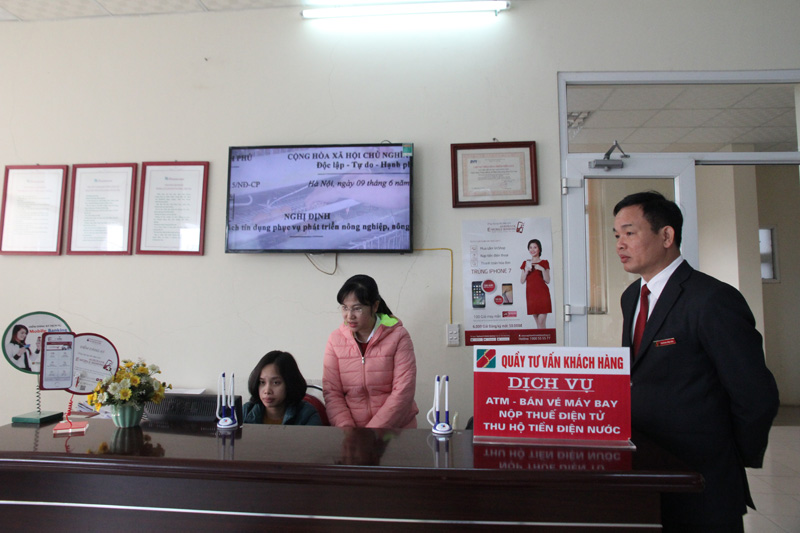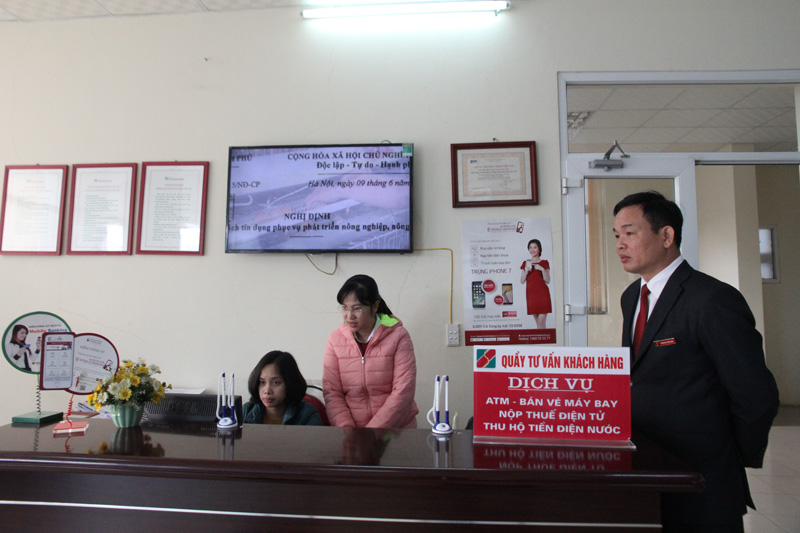
(HBO) – The State Bank of Vietnam (SBV)’s branch in Hoa Binh province has issued a plan to promote payments for public services via banks.
 Agribank’s Song Da branch
(Hoa Binh city) provides consultancy for customers about online payments of
tax, electricity and water bills.
Agribank’s Song Da branch
(Hoa Binh city) provides consultancy for customers about online payments of
tax, electricity and water bills.
In Hoa Binh province, cashless payments are
mainly applied at local trade centres and via automatic debit, transactions at
ATM, POS, internet banking, mobile banking, and e-wallet. Customers could pay
electricity and water bills at some supermarkets and trade centres as well as
buy products through the Internet.
The SBV branch in the province is stepping
payments for public services via banks. This is one of the key solutions to
improve the local business environment and competitiveness in 2020 with
orientations to 2021.
It is also building a plan under which
commercial banks are requested to push ahead with administrative reforms and
make it easier for businesses and local residents to get access to banking
services. Organisations and individuals are expected to change their habit of
paying in cash.
The SBV branch hopes to increase the
transparency of payment activities in the economy and personal incomes in society,
as well as contribute to the prevention of corruption, negative phenomena and
economic crime.
Commercial banks in the province have
coordinated with relevant units to provide public services to achieve specific
goals. For example, 100 percent of schools, education facilities, hospitals,
medical centres, and general clinics will accept tuition and hospital fee
payments via banks. All electricity and water suppliers will allow households
and individuals to pay bills through banks.
The province also aims to promote e-payment in
e-commerce, introduce payment forms via banks for supermarkets, restaurants,
shopping centres, and distribution facilities./.
According to data from the Hoa Binh Provincial Party Committee, the industrial production index for the first six months of 2025 is estimated to have increased by 20% compared to the same period last year. This marks the highest year-on-year growth rate for this period since 2020.
In the first six months of 2025, Hoa Binh province’s export turnover was estimated at 1.145 billion USD, marking an 18.11% increase compared to the same period in 2024. Import turnover was estimated at $ 804 million, a 17.15% increase, which helped the province maintain a positive trade balance.
The lives of the ethnic minority farmers in Tan Lac district have gradually improved thanks to the new directions in agricultural production. This is a testament to the collective strength fostered through the professional associations and groups implemented by various levels of the district’s Farmers’ Union.
With the motto the "product quality comes first,” after nearly one year of establishment and operation, Muong village’s Clean Food Agricultural and Commercial Cooperative, located in Cau Hamlet, Hung Son Commune (Kim Boi district), has launched reputable, high-quality agricultural products to the market that are well-received by consumers. The products such as Muong village’s pork sausage, salt-cured chicken, and salt-cured pork hocks have gradually carved out a place in the market and they are on the path to obtaining the OCOP certification.
In the past, the phrase "bumper harvest, rock-bottom prices" was a familiar refrain for Vietnamese farmers engaged in fragmented, small-scale agriculture. But today, a new spirit is emerging across rural areas of Hoa Binh province - one of collaboration, organisation, and collective economic models that provide a stable foundation for production.
Maintaining growing area codes and packing facility codes in accordance with regulations is a mandatory requirement for agricultural products to be eligible for export. Recently, the Department of Agriculture and Environment of Hoa Binh province has intensified technical supervision of designated farming areas and packing facilities to safeguard the "green passport" that enables its products to access international markets.



 Agribank’s Song Da branch
(Hoa Binh city) provides consultancy for customers about online payments of
tax, electricity and water bills.
Agribank’s Song Da branch
(Hoa Binh city) provides consultancy for customers about online payments of
tax, electricity and water bills.